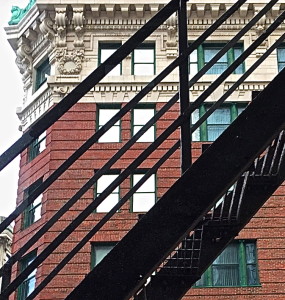I think about my new route to routine as I slog through snowbanks and across icy sidewalks, after the long haul made on a struggling blizzard-wracked T, heading to where my paces begin.
Why does a freelance writer need this? I work from home. So why don’t I do my own “work” from home? Without the organization, even difficulty, of making my way to it, the routine for poetry disappears. When I’m home, at my kitchen table, surrounded by the dishes, the laundry—or more pressing, the freelance jobs—the routine is pushed aside, made dispensable. But when something forces me to move towards it, it suddenly becomes accessible.
Before now, my writing habit was anything goes. Emails to myself sitting in the pickup line of cars at my children’s school. Longstanding dates with myself—an extended weekend away, the luxury of a residency, a coffeebreak tryst with the keyboard. Structures and scaffolding are put in place to allow for writing whenever possible. Even now, with the gift of the Writers’ Room, it’s one morning a week—set in stone—to put me, Writing Me, in balance.
 I look out on an old rusted fire escape outside the window past my desk and
I look out on an old rusted fire escape outside the window past my desk and
imagine myself climbing down all these flights, into myself, away from the daily heat, the feeling I’m burnt, the intensity of everyone’s needs, and my need to put out fires all day long. Foot after foot, hand on the railing, I make my way into the words and it’s work, just like the work I’d put in at the gym if I could only find the time.
The muscles of my routine have gone slack. I’ve filled my time with other things, and it’s an uphill battle to regain them. Going through the motions are as important as having the inspiration, having anything at all to say. Fail again, fail better as Anne Carson quotes Beckett in her epigraph to Red Doc. Without going through the motions, there can be no sequel at all. Time blows through and leaves us wondering why we have nothing to show for it.
And time passes so quickly. It’s no wonder so many of us can’t find time to write. The solitude is fleeting and some of us, like me, are slow getting started. For most city dwellers, the issue is space. So where time and space come together for the writer, a world takes shape. We find our entry, make our routine, and build that world into daily life. Or we pull it over us, like a snail shell, carrying that home with us, even when it’s hard. The writing life became difficult for me when I had children, for what I found was that Motherhood dispels our own routines as we help others build theirs. The impossible problem, figuring out how to recreate space and time. But at some point as I turned that question in my mind, remembering those days when I was able to wake up at 5 a.m. to write (and still function during the day)—and those long Sunday afternoons that I gave over to working on poems, I thought, when they’re older, they’ll ask me why I didn’t keep on writing. What happened? Why did you stop? I don’t want them to feel guilty or think I just gave up. I want to show them structure, and balance, but most of all, I want to show them how to wrestle with a calling—how, in this overtaxed, multi-tasked, sped up world, to put up a fight.
Valerie Duff, 2015 Poetry Fellow


